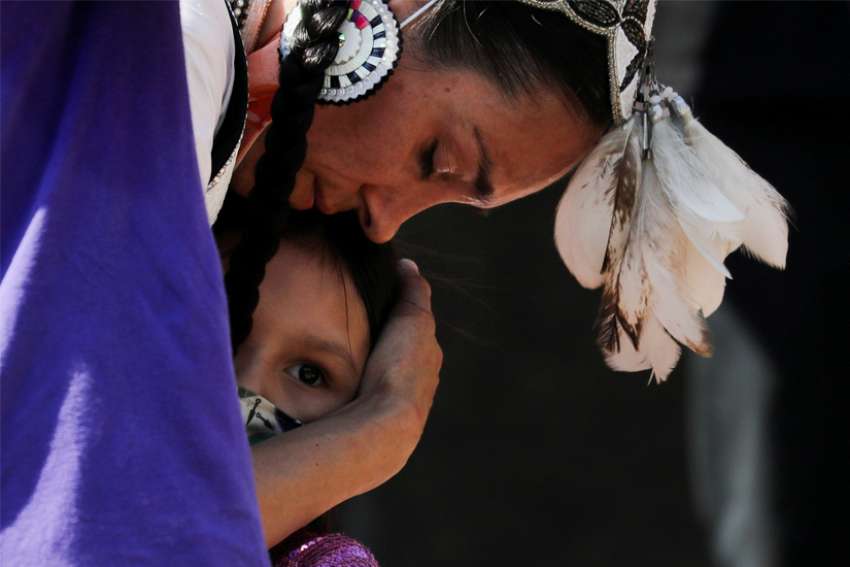Duquette is vice president academic and dean, as well as a professor of literature at Our Lady Seat of Wisdom College (SWC) in the village of Barry’s Bay, Ont., which is about two hours west of Ottawa.
Duquette might be described as a serious Catholic and academic presented to the world in a blanket of joy. Her wide, beaming smile alternated with a deeply reflective countenance during our recent conversation.
A recipient of two Chawton House Fellowships, which are awarded by a private British charity, she was enabled to do research on the grounds of the country estate of Jane Austen’s brother. A specialist in Romanticism as well as in the writings of Austen, she recently entered into a contract with Cambridge University Press for a book about women’s contemplative poetics in the 18th (and early 19th) centuries.
Given her interest in Romanticism, it might seem surprising that Duquette also has a deep interest in Indigenous culture and literature, but she developed a great appreciation for these subjects from her family.
Duquette learned from both her father and stepfather to have a deep respect for the land, and gratitude for the animals living on it. Her father, an environmentalist, was born to Ukrainian immigrants in Northern Alberta, where he would hunt with his Cree friends. He was in this way exposed to Indigenous hunting culture in which gratitude is expressed to the animal for giving its life. Her stepfather was Ojibwe and Potawatomi and also had a big impact on Duquette through his quiet but substantial respect for Creation. He also taught her how to carve in stone, with a still, silent reverence.
Duquette originally taught the Indigenous literature course at Tyndale University in the winter of 2019. This past semester, she offered the course at SWC.
The SWC course offered a diverse selection of readings from writers of a variety of North American Indigenous cultures, including Cree, Métis, Lakota, Cherokee, Muscogee, Ojibwe, Algonquin, and Mi’kmaq. Some of the dozen writers studied included Maria Campbell, Joy Harjo, Waubgeshig Rice, Richard Wagamese, Thomas King, and Tomson Highway. Students also studied transcribed oral accounts of 19th century Oglala Sioux Black Elk.
In addition, thanks to sponsorship by the Knights of Columbus, there were two in-person presentations by visiting speakers, as well as an online presentation by Myra Olver, a Métis woman.
Naomi Peters taught the students the Ojibwe language, and Kevin Lamarr, of the local Pikwakanagan First Nation, spoke about the Algonquin culture. Peters had been part of a team of artists whose murals were placed on the Gordie Howe International Bridge Canadian tower. Duquette described Lamarr as a very moving speaker who drummed for the students. During the presentation, Lamarr explained that unlike the Hollywood-style stereotypes of Indigenous persons using drums for warfare, they are really used for peacemaking. When different Indigenous groups had a disagreement, they would come together around a traditional drum. He also said that when we hear this type of drum, it’s like a child hearing the sound of a mother’s heartbeat in the womb.
Some students, according to Duquette, had initially expressed nervousness about taking the course, but found a great deal of laughter, authenticity, and spirituality in the readings along the way. In addition, they expressed great appreciation for the presentations of the guest speakers.
Despite dealing with very serious topics, much humour can be found in the works of Indigenous writers. In this way, Duquette finds some parallels in Jane Austen’s works as they share “a sense of humour, social critique, and a view from the margins.”
Duquette has learned from her work in this course and at SWC generally that God can do impossible things when we risk doing something brand new. She finds hope in people listening to each other, which is one road toward reconciliation with First Nations peoples.
Although Duquette doesn’t expect to be teaching this particular course again until 2025-2026, she will be including Indigenous writers in her upcoming Canadian Literature course. She encourages those outside of SWC to consider auditing some of their courses. Courses are offered in-person, and in hybrid and online versions as well.

